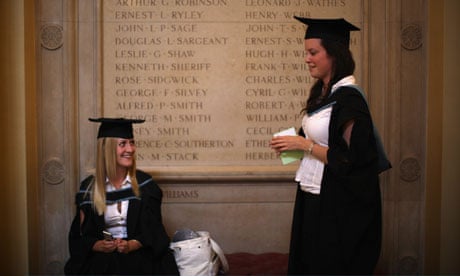The clearing process for teenagers who fail to make their A-level grades this summer will be "the most frantic and stressful in living memory", the general secretary of the University and College Union (UCU) has warned.
Sally Hunt, the leader of the lecturers' trade union, said: "The stakes have never been higher for university applicants. With tuition fees set to treble from 2012, demand for places this summer is likely to be unprecedented.
"I fear that clearing will be the most frantic and stressful in living memory with thousands of young people, encouraged to aspire to university throughout their lives, left disappointed. Those who are unable to get a place this year face the prospect of having to pay the highest public university fees in the world."
However, Mary Curnock Cook, the chief executive of the Universities and Colleges Admissions Service (Ucas), told the Observer there were no signs that the near-trebling of tuition fees would spark a dramatic rise in competition for places. She predicted that the number of students eligible to enter clearing would be similar to last year – just over 209,000 – and they will be competing for roughly the same number of places – just over 46,000.
Clearing matches students who have not received offers of a place at university, or been turned down by their original choices due to poor grades, to other available courses. Last summer, most students who gained a place through clearing were matched to a course within a week to 10 days.
Curnock Cook did advise students to act quickly this year. Ucas has hired double the number of advisers to take calls from disappointed students and predicts courses will fill up quickly. There will be 150 Ucas staff taking calls and, for the first time, eight advisers will give advice and answer queries through Twitter and Facebook.
"I'm expecting clearing to be broadly similar to last year. But we are putting on more people to answer calls and monitor our online resources," Curnock Cook said. "The idea is to give the information quicker so [students] have as much space as possible to make their decisions as quickly as possible."
She urged teenagers not to make decisions hastily. Last year, there were at least 14 vacancies on medicine and dentistry degrees and members of the Russell Group, which represents the 20 most competitive universities in the UK, offered 2,988 places in clearing.
"You can't just sit back and wait in clearing, but equally don't think [getting into a top university] is a lost cause," she said. "Search the vacancies and get on the phone." She said students who had a straightforward query, such as how to join clearing or how to find a lost log-in, should post their question on Twitter or Facebook. "If we can answer some queries on Facebook and Twitter, it takes the pressure off," she said.
However, a poll of almost 60 institutions conducted last week by the Press Association found that one in four thought it unlikely that they would have any vacancies. It has also emerged that many of the UK's leading Russell Group institutions have no places left on undergraduate courses. Oxford, Cambridge, Bristol, the London School of Economics, Imperial College London, Warwick, University College London and Edinburgh are not entering clearing.
Surrey, Oxford Brookes, Chester, Leeds Metropolitan, Reading and Harper Adams University College said they had no places in clearing. However, Cardiff, King's College London and Lincoln universities had some places.
Goldsmiths, University of London, estimated it would have 100 places this year for UK and EU students, down from 200 last year. Leicester University had around 80 places last year, and expects fewer, if any, to be on offer this summer. Wolverhampton University, which offered 800 places through clearing last year, estimates it will have only 100 to 150 this year.
A spokesman for the Department for Business, Innovation and Skills (BIS) said: "Going to university is a competitive process and not all those who apply are accepted. We provided an additional 10,000 places last year and universities will again be able to recruit the same number of new students this autumn."

Comments (…)
Sign in or create your Guardian account to join the discussion